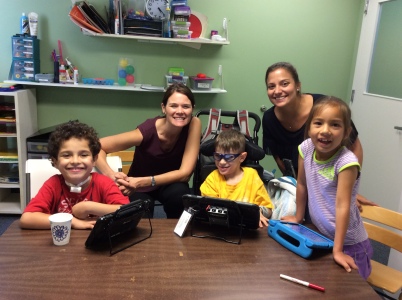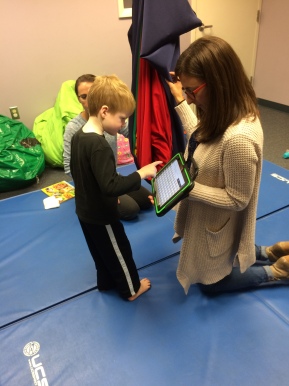
October is not just for costumes and candy. It also happens to be AAC Awareness Month! Our assistant director, Amy Bereiter, MS, CCC-SLP, is a LAMP certified professional and leads our AAC team here at Skill Builders. She is taking over the blog today to give us the basics on AAC!
What is AAC?
AAC stands for Augmentative or Alternative Communication (AAC). This is any system that augments a person’s existing speech (augmentative) or is replacement to speech (alternative) when speech is not possible. AAC systems can take many forms. A low tech system has no voice output, a id tech system has voice output but has a static display, and a high tech system has voice output and a dynamic display screen.
Who is AAC appropriate for?
AAC is for anyone across the age span with congenital, developmental, or acquired communication challenges. Anyone who:
*Has little to no speech
*Has speech but very few spoken words (language), or limited variety of spoken words
*Has speech but it is not intelligible
*Has speech but language is not spontaneously used or is echolalic
At Skill Builders, because we are a primarily pediatric clinic, we see a lot of children who are still developing language. AAC is a highly effective tool that we can use to help them do just that! We often work on speech simultaneously, and for those with no speech or when speech is very difficult to produce, we continue to develop language and communication skills via AAC.
Myths?
There are many myths floating around out there about AAC, but here some frequently heard myths about AAC:
*It will inhibit my child’s speech development- FALSE
*My child has some words so he doesn’t need it- FALSE
*The child has to have mastered various other low tech systems before gaining access to a high tech system- FALSE
*The child has to have strong cognitive skills in order to use AAC- FALSE
*I can understand my child/know what they need so he doesn’t need AAC- FALSE
*Once a child gets an AAC system, he should immediately know how to use it FALSE
General principles:
*Communication happens in all settings across the day! Therefore, AAC systems should be available across all settings.
*AAC systems should allow access to a large amount of vocabulary from all parts of speech.
*AAC should not focus solely on requesting, but on the many communicative functions we use.
*AAC should make life easier, not stressful, and the child should not feel like it is ‘work.’
*For kids, whose occupation is play, it should be taught in a play based context and in functional activities.
There is so much that could be said, but we hope this helps to raise awareness about the value and benefit of using AAC for children with communication challenges! For more information, check out our previous post on AAC Myths. You can also check out the Center for AAC and Autism’s page about the LAMP approach. Skill Builders is proud to be the only LAMP Center of Excellence in the state of Virginia.

To talk to a professional about whether or not your child might benefit from AAC, contact Amy at amy@skillbuildersllc.com.
-Elizabeth Clark McKenzie, MS, CCC-SLP
